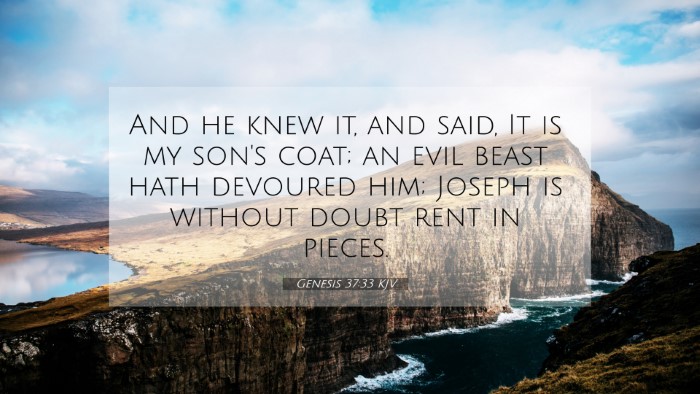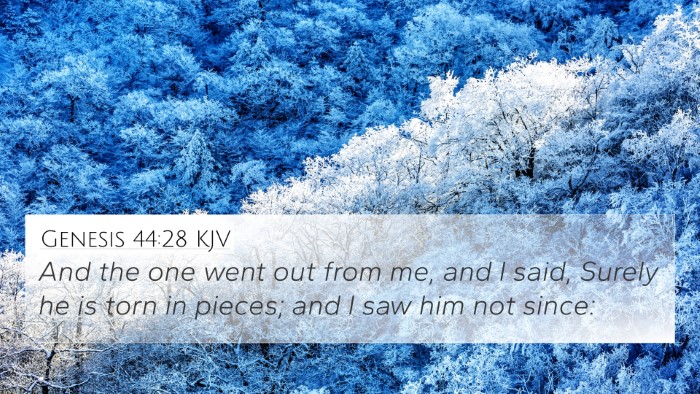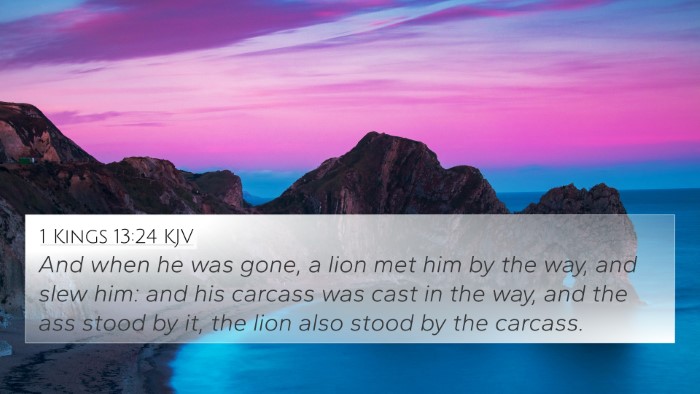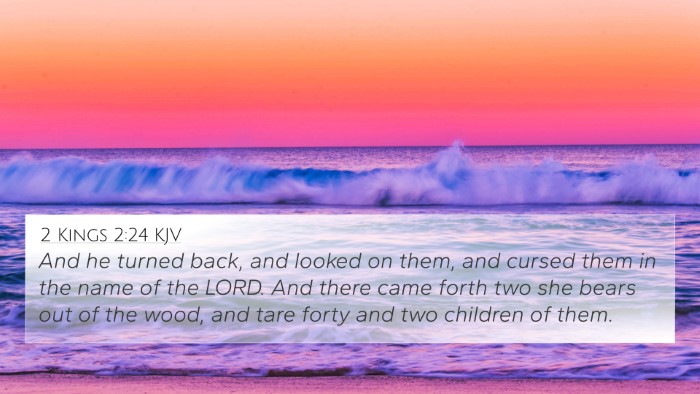Bible Verse Meaning: Genesis 37:33
Verse: “And he knew it, and said, It is my son's coat; an evil beast hath devoured him; Joseph is without doubt rent in pieces.” - Genesis 37:33 (KJV)
Summary of Meaning: In Genesis 37:33, Jacob identifies Joseph's coat, believing it to be evidence of his son's demise. This moment showcases Jacob’s deep sorrow and provides insight into his character and the painful consequences of deception and familial conflict.
Context and Analysis
This verse occurs in the narrative of Joseph's brothers deceiving their father into believing that Joseph has been killed by a wild animal. The brothers had dipped Joseph's coat in goat's blood and presented it to Jacob, leading him to mistaken conclusions. Public domain commentaries highlight key themes and interpretations:
- Matthew Henry's Commentary: Jacob's recognition of the coat signifies his deep attachment to Joseph and the despair that accompanies loss. Henry notes that Jacob's immediate reaction stems from the years of love he bestowed upon Joseph, showcasing the profound effect of his perceived loss.
- Albert Barnes Commentary: Barnes emphasizes the tragic irony: Jacob unwittingly affirms the deception enacted by his own sons. The coat symbolically represents favoritism and the fractures within the family, a precursor to the trials that lie ahead for both Jacob and Joseph.
- Adam Clarke’s Commentary: Clarke remarks on the psychological state of Jacob, indicating that grief can obscure reason and lead to misinterpretation of facts. This moment underscores the critical role of communication and the devastating impact of family betrayal.
Thematic Connections
This verse resonates with various themes found throughout scripture, including:
- Deception and Its Consequences: The brothers’ act of deceit has significant repercussions for their family dynamic, reminiscent of biblical principles regarding honesty and integrity.
- Suffering and Grief: Jacob’s sorrow reflects a universal theme of grief seen in other biblical narratives, such as Job's lamentations and David's mourning for Absalom.
- Family Rivalry: The complexities of favoritism within families as explored through Jacob’s preference for Joseph manifests in conflicts and tragic outcomes, echoing stories of sibling rivalry throughout the scripture.
Cross-References
Genesis 37:33 can be linked to several other verses that illuminate its themes and context:
- Genesis 37:31-32: The act of the brothers presenting the coat to Jacob, reinforcing the deception.
- Genesis 37:34-35: Jacob's deep mourning and refusal to be comforted, illustrating the profound sorrow of loss.
- Genesis 42:36: Jacob expresses similar despair over the potential loss of Simeon and Benjamin, showing ongoing concern for his sons.
- Genesis 44:29-31: Jacob fears the loss of Benjamin due to the repeated pattern of loss within his family, linked back to his grief over Joseph.
- Job 14:1: This verse speaks to the nature of human suffering and mortality, paralleling Jacob's pain.
- Psalm 34:18: A verse of comfort, indicating God's closeness to the brokenhearted, applicable for reflection on Jacob’s sorrow.
- Luke 23:28-31: Jesus speaks about mourning, establishing a connection between human grief and redemption.
Comparative Analysis of Scriptures
Using tools for Bible cross-referencing, one can examine the interrelations of Genesis 37:33 with the broader biblical narrative:
- Identifying Connections: Recognizing patterns of betrayal and its emotional aftermath presents a thread that runs deep within scripture.
- Old and New Testament Parallels: The suffering of Jacob prefigures deeper themes of suffering seen in the life of Christ.
- Bible Cross-References for Study: Exploring each cited verse with tools like a Bible concordance facilitates a comprehensive understanding.
- Comparative Studies: A comparative study of Jacob's family narrative with that of other patriarchs can offer deeper insight into family dynamics in Israel’s history.
Final Thoughts
Genesis 37:33 serves as a poignant reminder of the themes of loss, deception, and sorrow found throughout the Bible. By employing a cross-referencing Bible study approach, we can appreciate the connections between this verse and others, enhancing our understanding of scriptural dialogue on human emotion and familial relationships.
Keywords Utilized: Bible verse cross-references, connections between Bible verses, comparative Bible verse analysis, scriptural cross-referencing, inter-Biblical dialogue, tools for Bible cross-referencing, identifying connections between Old and New Testament.








